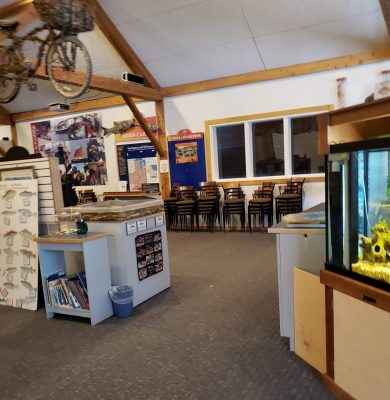Engaging in the Great Lakes Food Web
 SUTTONS BAY, January 20, 2020 – Inland Seas Education Association (ISEA) received a $27,500 grant from the Rollin M. Gerstacker Foundation to update their hands-on education exhibits in the Capt. Thomas M. Kelly Biological Station. The remodel will emphasize the Great Lakes food web so that it complements their educational programs. The education center is open and free to the public.
SUTTONS BAY, January 20, 2020 – Inland Seas Education Association (ISEA) received a $27,500 grant from the Rollin M. Gerstacker Foundation to update their hands-on education exhibits in the Capt. Thomas M. Kelly Biological Station. The remodel will emphasize the Great Lakes food web so that it complements their educational programs. The education center is open and free to the public.
The education center in the Capt. Thomas M. Kelly Biological Station currently houses invasive species exhibits, freshwater fish and turtle tanks, and a touch tank. The space has not been updated since the facility was first renovated in 2003. “The remodel of the education center exhibits will change the atmosphere of the center, update information, realign the exhibits with our ship programming, provide year-round programming opportunities, and help us realize the goal of 100% electrical sustainability,” said Fred Sitkins, ISEA’s Executive Director.
The exhibits in the center currently focus on invasive species. While this information is important to know about the Great Lakes, they are only one component of the Great Lakes story. Changing the focus of the exhibits to the Great Lakes food web will change the atmosphere of the center from negative to positive. Individuals and groups visiting the center will still learn about invasive species but in the context of the food web. “We want people to understand the health of the Great Lakes through the food web and the threats (i.e., invasive species, microplastics, etc.) to them, without focusing on just the negative aspect of invasive species,” shared Sitkins. “We strive to inspire hope in the students we work with so it’s important that we don’t simply communicate a doom and gloom narrative about our Great Lakes.”
Plans for the exhibit space include Great Lakes food web graphics over time; an interactive video computer station and microscope with slides at the plankton exhibit; a macroinvertebrate collection in resin pucks and a benthos tunnel for the younger age group; a human impact exhibit with ISEA’s microplastics citizen-science research as well as other issues such as toxins from run-off and water clarity issues; invasive species exhibit; current science news; ideas and inspiration wall; a floor secchi marker “exhibit;” and a ship exhibit.
The Rollin M. Gerstacker Foundation had previously granted ISEA $25,000 toward a $1.5 million renovation project creating the Capt. Thomas M. Kelly Biological Station in 2019. The focus of this significant project was to allow Inland Seas to more effectively reach students from greater distances, deepen the impact of their programming, and ensure for the long-term sustainability of Inland Seas. Remodeling the education center will provide an opportunity for year-round ISEA educational programming. Programming, similar to what is learned on the ship, can be done in the remodeled education center and lab space.